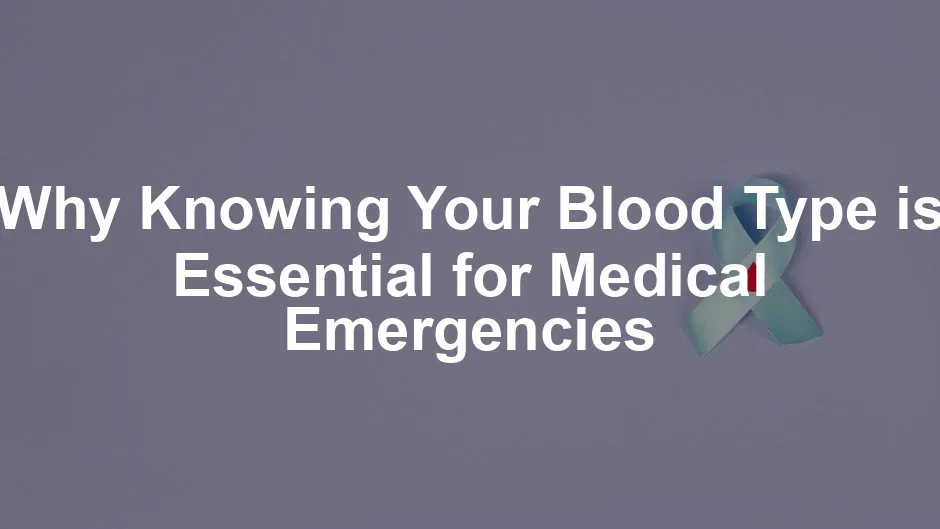
Why Knowing Your Blood Type is Essential for Medical Emergencies
Introduction
In a world where health emergencies can arise unexpectedly, knowing your blood type is more than just a fun fact; it’s potentially life-saving. Picture yourself in an accident, unconscious, and in dire need of a blood transfusion. Medical professionals scramble to find compatible blood, but if only you had known your blood type! From urgent transfusions to critical pregnancy concerns, blood types play a pivotal role in our health.
Many people remain unaware of their blood type, which can be worrying. Did you know that over half of Americans don’t know theirs? It’s high time we change that. Understanding your blood type can help ensure that you receive the right care during emergencies and improve your overall health management.
In this article, we’ll discuss why knowing your blood type is essential. We’ll highlight its significance in medical emergencies, pregnancy considerations, and how it can even offer insights into your health risks. Ready to learn? Let’s jump right in!
Summary of Key Points
Understanding your blood type is crucial for several reasons:
- Emergency Preparedness: In critical situations, knowing your blood type accelerates the transfusion process, ensuring safety and compatibility.
- Health Risks: Different blood types come with varying health risks, including heart disease and certain cancers.
- Pregnancy Considerations: Awareness of blood type is vital for preventing complications related to Rh incompatibility during pregnancy.
- Blood Donation: Knowing your blood type enhances your ability to donate effectively, especially in times of need.
- Personal Health Insight: Your blood type can provide insights into genetic traits and potential health conditions you may be predisposed to.
This article will explore these points in detail, helping you understand why knowing your blood type can be one of the most important pieces of information you can have about your health.
Importance of Knowing Your Blood Type
Understanding Blood Types
What are Blood Types?
Blood types classify our blood based on specific markers called antigens. There are four primary types: A, B, AB, and O. Each type is determined by the presence or absence of A and B antigens on red blood cells. If you have A antigens, you belong to type A; B antigens indicate type B; both A and B signify type AB; and neither indicates type O.
But wait, there’s more! The Rh factor adds another layer of complexity. This protein can either be present (positive) or absent (negative). So, when these two systems combine, we get eight unique blood types: A+, A-, B+, B-, AB+, AB-, O+, and O-.
How Blood Types are Determined
Your blood type is inherited from your parents. It’s all about genetics and the antigens you get from them. When blood cells form, they either have A or B antigens on their surface, or they might lack both. If you inherit an A antigen, congratulations, you’re A! No A or B? You’re type O. The Rh factor works similarly—if you have it, you’re Rh positive; if not, you’re Rh negative.
Understanding your blood type is crucial for numerous reasons, particularly in medical contexts. It’s not just a fun fact; it’s vital information that can affect your health and safety.
Emergency Situations
Importance in Emergencies
In medical emergencies, knowing your blood type can be a game changer. Imagine being rushed to the hospital after an accident. Medical staff need to act quickly to provide blood transfusions, and having your blood type on hand can save precious time. If you don’t know your blood type, they’ll have to perform tests, which delays treatment. Time is of the essence, and that’s where your blood type knowledge comes in handy!
Compatibility of Blood Types
Not all blood types are interchangeable. Transfusions require compatible blood to prevent serious complications. For example, a person with type A blood can receive type A or O blood. Type O, known as the universal donor, can give blood to anyone, while AB+ is the universal recipient. Confusing, right? Here’s a quick compatibility rundown:
- Type A: Can receive A and O.
- Type B: Can receive B and O.
- Type AB: Can receive from all types.
- Type O: Can only receive O.
Incompatible transfusions can lead to severe reactions, including kidney failure and even death. This highlights the need for accurate blood typing in emergencies.
Case Studies
Statistics show that transfusion complications due to unknown blood types are not rare. Research indicates that about 1 in 20 transfusions leads to serious complications if the blood types are mismatched. There are even real-life stories of patients who suffered severe reactions simply because their blood type was unknown. For instance, a patient requiring immediate surgery may receive the wrong blood, leading to a cascade of health issues. Knowing your blood type could have prevented that.
In conclusion, knowing your blood type is essential for navigating medical emergencies. It streamlines the process for healthcare providers, ensuring you receive the right treatment without unnecessary delays. So, do yourself a favor: find out your blood type today. It just might save your life!

Health Risks and Conditions
Knowing your blood type isn’t just a quirky fact; it can provide insights into your overall health. Research suggests a correlation between blood types and various health risks. For instance, studies have indicated that individuals with type A blood may face a higher risk of developing gastric cancer. Meanwhile, those with type O blood tend to enjoy a lower risk of heart disease and blood clots. Isn’t it fascinating how a little letter can pack such a punch?
Blood type may also influence susceptibility to other conditions. For example, type AB individuals have been linked to a greater risk of stroke. This connection arises from the unique composition of clotting factors present in different blood types. If you’ve ever wondered why some people seem to be more prone to certain health issues, your blood type could be a crucial piece of the puzzle.
Furthermore, understanding your blood type can empower you to make informed health choices. For instance, if you’re aware that your blood type correlates with a higher risk of certain conditions, you can take preventive measures. This might include adopting a heart-healthy diet, engaging in regular exercise, and scheduling check-ups with your healthcare provider. It’s all about being proactive!

And speaking of being proactive, consider incorporating a Health Tracking Journal into your routine. It’s a fantastic way to monitor your health, track symptoms, and keep a record of your medical history. Plus, it helps you stay organized, so you can focus on being fabulous!
Knowing your blood type also opens the door to personalized healthcare. Your doctor can tailor recommendations based on your specific risks linked to your blood type. For example, if you’re type B, they might suggest strategies to manage your cardiovascular health. The more you know, the better equipped you are to navigate your wellness journey.
In summary, understanding your blood type can help you identify potential health risks and guide you toward proactive health measures. So, why not take charge of your health and uncover the insights your blood type has to offer? Why do we have different blood types and what do they mean
Understanding your blood type can provide crucial insights into your health risks. Why do we have different blood types and what do they mean
Pregnancy Considerations
When it comes to pregnancy, knowing your blood type is a must. One of the most critical aspects is the Rh factor. If an Rh-negative mother carries an Rh-positive baby, complications can arise. The mother’s immune system might recognize the baby’s Rh-positive blood as foreign, leading to potential health issues for the baby. This condition is known as Rh incompatibility, and it can have serious consequences if left untreated.
During pregnancy, healthcare providers routinely test for blood type and Rh factor. If a mother is found to be Rh-negative, doctors may recommend an injection of Rh immunoglobulin to prevent the development of antibodies against Rh-positive blood. This preventive measure is crucial for safeguarding the health of both mother and child.
Knowing your blood type also helps prepare for any complications that may arise during childbirth. If the mother’s blood type is incompatible with the baby’s, medical teams can plan appropriate interventions to protect the newborn’s health.
In conclusion, awareness of blood type is essential for expectant mothers. It enables timely interventions to prevent complications related to Rh incompatibility, ensuring a healthier pregnancy and delivery experience. So, if you’re planning to start a family or already expecting, make sure you know your blood type!

Blood Donation and Community Impact
Blood donation is not just a charitable act; it’s a lifeline for many. Every two seconds, someone in the U.S. requires a blood transfusion. Knowing your blood type can significantly enhance your contribution to this vital cause. Imagine showing up at a donation center with the knowledge of your blood type; it encourages you to donate more often, knowing the impact your specific type can have.
Each blood type serves a unique purpose in the community. For instance, type O-negative blood is the universal donor, meaning it can be given to anyone in need. Unfortunately, only about 7% of the population has this type, creating a constant demand. In contrast, type AB+ individuals are the universal recipients, yet only 3% of the population falls into this category. This imbalance highlights the importance of knowing and sharing your blood type to help meet community needs.
Statistics reveal staggering facts about blood donation: approximately 10% of eligible donors give blood annually, yet hospitals often report shortages. For example, the American Red Cross states that blood donation is especially critical for diverse communities, where certain blood types may be more prevalent. Type O is particularly crucial due to its universal compatibility, and knowing your type can motivate you to donate, potentially saving lives in your community.
In short, understanding your blood type not only empowers you to donate effectively but also enhances community health. The next time you consider donating blood, remember that your type could be the one that makes a difference!

How to Find Out Your Blood Type
Finding out your blood type is easier than you might think! There are several methods available, ensuring you can discover this vital piece of information with little fuss.
One of the simplest ways is to visit your doctor. During a routine check-up, you can request a blood type test. This method is reliable and gives you peace of mind knowing you’re in professional hands. Generally, two tests are performed: forward typing, where your blood is mixed with antibodies, and reverse typing, to confirm results.
Another great option is donating blood. When you donate, blood banks perform tests to determine your blood type. They’ll provide you with a donor card that includes this crucial info. Plus, you’ll be helping someone in need while you’re at it!
Feeling adventurous? You can also opt for at-home blood typing kits. These kits allow you to check your blood type with just a few drops of blood from a finger prick. However, keep in mind that these kits might not be as accurate as professional methods, so always double-check with your healthcare provider if you’re uncertain.
During testing, you might feel a slight prick from the needle, but discomfort is usually minimal. Afterward, you might experience mild bruising or throbbing, which typically goes away quickly. Knowing your blood type is a small effort that can have a profound impact on your health and safety. So, why not take the plunge and find out today?

And while you’re at it, consider getting a Blood Typing Kit. It’s a fun and easy way to discover your blood type at home. Just think of it as a science experiment that could save your life!
Conclusion
In conclusion, knowing your blood type is not just a trivial detail; it’s a vital piece of information that can have serious ramifications during medical emergencies and beyond. From facilitating safe blood transfusions to aiding in understanding potential health risks, being aware of your blood type equips you to manage your health proactively. It’s like having a secret weapon in your health arsenal!
Imagine facing a health crisis and needing a transfusion, only to realize you don’t know your blood type. Panic, confusion, and delays ensue, potentially jeopardizing your well-being. Instead, you could have had the peace of mind knowing your type—like having a trusty map in unfamiliar territory.
Additionally, knowledge of your blood type can guide you in pregnancy, where complications may arise due to Rh incompatibility. It’s crucial for expectant parents to know this information to prevent serious health issues for their babies.
So why wait for a crisis to learn such an essential fact about yourself? Take the initiative today! Whether it’s through a simple blood test at your doctor’s office, during a donation, or an at-home kit, finding out your blood type is a small step that could lead to significant health benefits. Don’t just leave it to chance—be proactive about your health!
And speaking of being proactive, make sure you’re stocked up on health essentials! A First Aid Kit is a must-have for any household. You never know when a minor emergency might strike!

FAQs
Why is knowing my blood type important?
Knowing your blood type is crucial for numerous reasons. In emergencies, it can expedite blood transfusions, ensuring compatibility and safety. Additionally, it aids in managing health risks linked to specific blood types and assists in planning for a healthy pregnancy to prevent complications like Rh incompatibility.
Can my blood type change?
Generally, your blood type remains constant throughout your life. However, rare circumstances—such as a bone marrow transplant or specific medical conditions—can change it. These scenarios are uncommon, so knowing your blood type is usually a lifelong fact!
How often should I check my blood type?
There’s no set frequency for checking your blood type. However, it’s wise to confirm it during significant life changes, such as pregnancy or when donating blood. If you suspect your blood type might be unknown or outdated, a quick test can clear things up.
What should I do if I don’t know my blood type?
If you’re unsure of your blood type, don’t fret! You can find out easily by scheduling a blood test at your doctor’s office, donating blood, or purchasing an at-home blood typing kit. Each method is straightforward and can provide you with essential health information.
Please let us know what you think about our content by leaving a comment down below!
Thank you for reading till here 🙂
And before you go, why not treat yourself to some delicious Healthy Snacks Variety Pack. After all, you deserve a treat for learning about your health!
All images from Pexels




